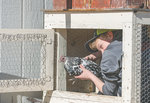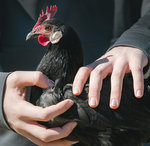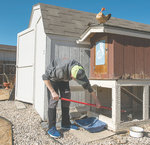Clear, 69° F
Annie, Kenya, Nihao and Lady Cluck rule the roost at the Carter residence, or at least the backyard.
The hens are part of the family, but there’s a pecking order. Roscoe, the Carters’ …
This item is available in full to subscribers.
The Powell Tribune has expanded its online content. To continue reading, you will need to either log in to your subscriber account, or purchase a subscription.
If you are a current print subscriber, you can set up a free web account by clicking here.
If you already have a web account, but need to reset it, you can do so by clicking here.
If you would like to purchase a subscription click here.
Please log in to continue |
|




Annie, Kenya, Nihao and Lady Cluck rule the roost at the Carter residence, or at least the backyard.
The hens are part of the family, but there’s a pecking order. Roscoe, the Carters’ dog, would like to be the boss, but he doesn’t have seniority over the chickens and must mind his P’s and Q’s. These also aren’t your average chickens: They’re show chickens.
Truett Carter, 13, has been showing his fancy bantams in association with 4-H for the past three years. He’s part of a growing trend of raising urban chickens. A recent study of 150 of the largest U.S. cities found more than 90% allow backyard flocks.
The City of Powell doesn’t quite fit in that category, but chickens have their spot here — in a well-regulated way.
City ordinances devote about 1,200 words to raising chickens within city limits, with an extensive list of rules. Most importantly, no person shall keep any rooster.
“They’re just too noisy,” said Titus Carter, 8.
There’s a $5 fee to get a permit. Once approved, you must allow inspections at the Powell Police Department’s discretion. Your chickens have to stay in the backyard and you can only have four at any time — even if chicks hatch. However, public schools aren’t required to obtain permits to hatch chickens from eggs within their classrooms; they’re exempt from the city’s requirements — provided that, after the eggs hatch, chicks stay at the school for no more than one week.
Also on the books: You can’t have a chicken living in your house and “no person shall slaughter any chickens within the city limits.”
Powell Police Chief Roy Eckerdt says making Powell fowl friendly has gone fairly well.
“There haven’t been many complaints,” he said.
There have been a couple issues with hygiene, but those have been cleared up quickly when addressed, Eckerdt said. One thing separates chickens from other family pets, however: If your chickens get out, you’re on your own.
“We’re not chicken wranglers,” Eckerdt said.
Poultry on the whole is also growing in popularity with children in 4-H across the country, said Tycee Mohler, Park County 4-H and youth development educator.
“The animals are cheaper to raise and require less maintenance,” Mohler said. But one major reason is it’s one of the few barnyard critters you can raise within city limits.
For Truett Carter, it wasn’t a recognition of U.S. trends, city regulations or egg production that pulled him in.
“We were in the hardware store and saw the chicks,” he recalled. “I thought, ‘Oh man, they’re really cute. I’m gonna get some of those.’”
Of course, Mary and Seth Carter had something to say about the prospect of the unique family pets. Fortunately for Truett and brother Titus, their parents were all for the idea.
“We kind of wish we could be out on the ranch or farm so we can have more so they could learn more about responsibilities. But this is the next best thing you can do in town,” Mary said.
Truett is in charge of cleaning the coop, keeping claws trimmed and working on the yearly budget. Including the annual permit, gate fees at the fair and food, the chicken project costs less than $100 a year, Truett said. The family even saved on the coop by going to the Habitat for Humanity ReStore to recycle old furniture into the chickens’ home.
“We made the coop out of an old baby crib, recycled wood and an old dog house,” Truett said.
The chickens are loved. “Ridiculously so,” Mary said.
She bonded with the chicks as well. Unfortunately, she picked the wrong chick to get attached to at first, one the family had named Frodo.
“We brought it to [our] mom and it thought Mom was its mom, so they were friends,” Truett said.
But Frodo turned out to be a rooster, which, of course, isn’t allowed. So they arranged a trade with a relative out of town for Kenya, a silver-spangled Hamburg.
The chickens seem to enjoy human company, often running with the children playing in the backyard and seemingly enjoying being handled.
“Our chicks never peck us. They haven’t pecked us their whole lives,” Titus said. “Well, at least since they were chicks.”
Another major benefit of chickens in the yard is insect control, Mary said.
“They keep the number of ticks down. In wetter climates people have them just to keep ticks out of their yards,” she said. “We don’t have even as many mosquitoes because they hunt through the grass.”
“They love grasshoppers, too,” Truett added.
As for their egg-laying abilities, it would take a lot of bantam chickens to produce enough for an omelette. Annie is a bantam turken; Kenya a silver-spangled Hamburg; Nihao a buff cochin; and Lady Cluck a bantam black minorca. Should they lay an egg a day, the flock would take almost two weeks to lay enough eggs to feed the Carters traditional three-egg omelettes.
The strict limit of four chickens also means the family can’t raise chicks, which would be fun for the kids, she said.
“We’re thankful,” Mary said, “but we kind of wish we could have a couple more.”
There are 27 youth already enrolled in the 4-H poultry program, Mohler said. If they want to show at the county fair, they need to be signed up by July 1. The organization is currently seeking a poultry project leader to help Park County kids.
“If someone has experience with poultry and wants to help kids learn, they’d be a good leader,” Mohler said.
She specializes in sheep and beef and knows she isn’t capable of leading groups interested in feathered farm animals.
“I’m afraid of birds,” she confessed. “All birds.”
The search for a volunteer continues.
“We need more adults to be volunteer leaders,” Mary said. “It really helps the kids to learn when we can actually hear from an expert. It really builds them up.”
The Carter family has another reason to learn as much as they can about helping their feathered family members — the kids learn about responsibility and sharing their love.
“God has created order to teach [us] to be stewards of everything God has made. They realize they’re not just accountable to how they feel, but also to the one who made everything, including the chickens,” Mary said. “To understand that things were made and created and given to us as a gift is a pretty important thing. Because then you have an issue of stewardship, not just taking care of them when you feel like it.”
She points to Proverbs 12:10: “A righteous man has regard for the life of his animals.”
“It’s easy for kids and parents to get lazy and to not take care of animals. We talk about the passage and how God’s the one who made them and so we’re accountable to God for what we do, because everything belongs to him.”